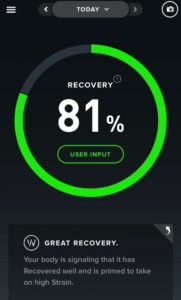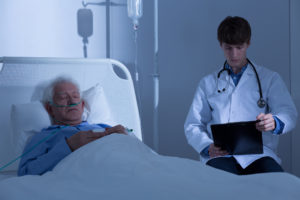Last month, I wrote about my newfound fascination with wearables and the physiological parameters I now measure on myself. One of these metrics is my “recovery score,” (Figure 1) which is heavily determined by the quantity, quality, and consistency (the regularity of the times at which I go to sleep each night and wake up each morning) of my sleep. Now that I wake up each morning being graded by my wearable on how well I slept, I have implemented strategies to improve my scores: wearing an eye mask, using blue light-blocking glasses at night, using my phone in bed, going to sleep at a regular time. These indeed have improved my recovery scores, and I honestly feel I sleep more efficiently as a result – I feel just as rested after 6 hours of sleep now as I previously did only with 7-8 hours of sleep.

My focus on my own sleeping habits led me to start reading the book, “Why We Sleep” by Dr. Matthew Walker. It is a fascinating review of the physiological role of sleep (or at least, the best knowledge we have of it), and I recommend it to anyone interested in the topic. While sleep has been studied intensely for decades, there still is much we do not know about how it benefits our bodies and minds. Some recent high-profile studies on sleep caught my attention though, including one published in Science that implicates the sleep-wake cycle in the regulation of the Alzheimer’s Disease-related tau protein in the brain.1,2 Another recent study suggests that when we cannot repay accrued “sleep debt” over the course of a week, at least with regards to its effects on metabolic dysregulation.3 However, as I continued to read about the importance of sleep and its health benefits, I could not help but think about some of the most sleep-deprived people we encounter regularly – our own patients.
Anyone who has worked in the inpatient hospital setting knows that admitted patients are regularly disrupted throughout the evenings in the hospital, and it is a rare evening they can get a full, restful night’s sleep. Indeed, one study showed that inpatients on average get 83 fewer minutes of sleep compared to their sleep duration at home.4 Some factors preventing sleep are related to the nature of their hospitalization and are difficult to circumvent – severe pain, hemodynamic instability, infections that produce significant discomfort (e.g., fever, cough).
Yet many factors are systematic and iatrogenic. Often, nurses receive orders to check vital signs every 4 hours, and thus are required to check in on patients in the middle of the night to measure blood pressures. Intravenous medication infusion pumps alarm seemingly every 5 minutes. Daily lab work is ordered to be performed early in the mornings, so that results will be ready by the time physician teams begin their rounds. And in teaching institutions, medical students and housestaff “pre-round” in the early hours (sometimes as early as 5:00am), waking their patients to briefly interview and examine them (Figure 2).

While clearly many hospitalized patients are in the hospital precisely because they need close monitoring, there is a large subset of admitted patients who, despite the need to be hospitalized, could be provided an environment in which they can get a full night’s rest. Many hospital systems are attuned to these issues, and I am proud to say that mine is as well, but many of the systematic factors that interfere with sleep are unfortunately just part of the rounding culture at academic hospital centers (early labs, pre-rounding, etc.).
A recent Twitter thread from a former co-resident of mine, Dr. Dan Wheeler (@WheelerMed), made me reflect on the purpose of morning rounds. Dr. Wheeler’s thread highlighted the heterogeneity in how different teams rounded and the challenges this may pose to trainees. Yet I could not help but think that the major problem with rounds is that, in my opinion at least, it is not patient-centered. In fact, given that many features of rounds interfere with an inpatient’s ability to obtain adequate sleep, rounds actually impede patient recovery.
Isn’t patient recovery our ultimate goal? When I spend so much time trying to improve my own “recovery score,” shouldn’t I also focus energy to improve the recovery scores of those who need it much more than I do?
As trainees, we arguably do not have much control of the rounding schedule and culture. But, my goal in writing this post is to challenge us to be mindful of these factors when we eventually do have the capacity to restructure the inpatient hospital routine, to focus appropriate attention and efforts to allow for adequate patient sleep and recovery. This field may actually be an exciting avenue for research, particularly in wearables that can appropriately monitor inpatients’ physiological parameters during sleep without disturbing them.
So before you go entering your patients’ rooms at 5:30am in the morning to pre-round, I encourage you to take an extra moment to ask yourself whether it’s truly necessary to wake them, or whether you can allow them the chance to improve their recovery score just a bit more.
References:
- Holth JK, Fritschi SK, Wang C, Pedersen NP, Cirrito JR, Mahan TE, Finn MB, Manis M, Geerling JC, Fuller PM, Lucey BP, Holtzman DM. The sleep-wake cycle regulates brain interstitial fluid tau in mice and CSF tau in humans. Science. 2019;363:880–884.
- Noble W, Spires-Jones TL. Sleep well to slow Alzheimer’s progression? Science. 2019;363:813–814.
- Depner CM, Melanson EL, Eckel RH, Snell-Bergeon JK, Perreault L, Bergman BC, Higgins JA, Guerin MK, Stothard ER, Morton SJ, Wright KP. Ad libitum Weekend Recovery Sleep Fails to Prevent Metabolic Dysregulation during a Repeating Pattern of Insufficient Sleep and Weekend Recovery Sleep. Curr Biol. 2019;29:957-967.e4.
- Wesselius HM, van den Ende ES, Alsma J, Ter Maaten JC, Schuit SCE, Stassen PM, de Vries OJ, Kaasjager KHAH, Haak HR, van Doormaal FF, Hoogerwerf JJ, Terwee CB, van de Ven PM, Bosch FH, van Someren EJW, Nanayakkara PWB, “Onderzoeks Consortium Acute Geneeskunde” Acute Medicine Research Consortium. Quality and Quantity of Sleep and Factors Associated With Sleep Disturbance in Hospitalized Patients. JAMA Intern Med. 2018;178:1201–1208.